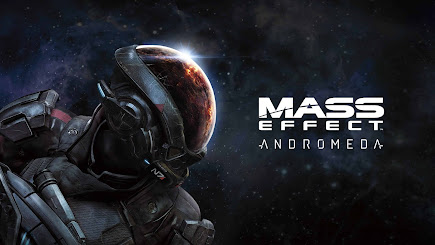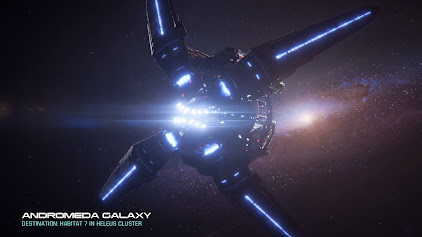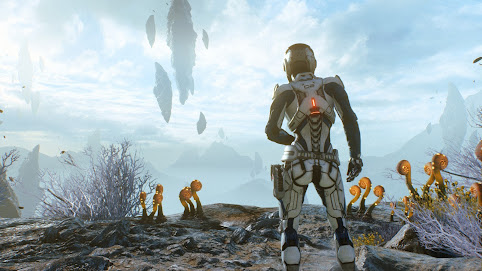The year 2819. 634 years ago, the Andromeda Initiative launched five space arks and a huge mobile space station towards the Andromeda Galaxy. 100,000 settlers from a dozen races were placed in cryo-suspension and a cutting-edge FTL telescope identified half a dozen "Golden Worlds" in the Heleus Cluster for colonisation. However, something has gone wrong. The golden worlds are now desolate and ravaged by radiation or ice or heat. Strange ruins guarded by robots can be found on many planets, and a hostile alien race, the Kett, have invaded and seem to be determined to subjugate the cluster and its native race, the Angara. Low on fuel, food and supplies, the Andromeda Initiative has to work hard just to survive. The human Pathfinder, Ryder, is given their own ship and a tough crew to help the expedition survive. There is no going back.
Andromeda is the fourth game in the Mass Effect series and, as the lack of numeration hints, also a soft reboot of the franchise. The original Mass Effect trilogy told one story that over hundreds of choices made over three games until different players could have wildly different outcomes to their versions of Commander Shepard's battle against the Reapers. As a result, to avoid "canonising" any of these choices, Andromeda moves the action 2.5 million light-years away to our nearest big galactic neighbour. Plenty of familiar races, technology and terms show up, but no familiar characters. It was definitely a bold solution to the problem.
Andromeda also shifts gears in terms of format and genre. The first three games were linear action-RPGs, dramatically increasing the action quotient and dialling back the RPG systems as the trilogy went along. Andromeda reverses that move, having more RPG, customisation and advancement systems than any game in the series to date. It also takes a leaf out of the original Mass Effect (2007) by focusing on exploration as a key mechanic, although a much simplified version of the search for resources mechanic from the second and third games is also present. There is also much more of an open-world feel to the game this time around, complete with large, expansive maps with lots of side-quests to undertake and collectibles to find.
The changes were controversial with fans, who felt that the success of the Mass Effect series is rooted in linear storytelling, focused characterisation and a relatively constrained playing time (each game in the Mass Effect trilogy clocks in at around 30 hours). Making Andromeda into an open-world game taking comfortably more than twice that long to complete was always going to be divisive, not helped by Andromeda certainly not having the sharp writing of the series at its best. The game also suffers from having to dial down the huge events and epic storytelling from Mass Effect 3 (2012) and start building a new narrative from scratch. After the huge events of Mass Effect 3, Andromeda feels small again which some took as a good thing (you can't really beat Mass Effect 3 for scale, and it'd be foolish to try) but others took as a sign of a lack of ambition.
Structurally, the game starts out as normal for BioWare: an early, linear section acts as a tutorial and also an introduction to the story and characters. You play either Scott or Sara Ryder, the twin children of Alec Ryder. Alec is a Pathfinder, a special exploration/reconnaissance specialist whose skills are boosted by the presence of an AI in his brain, named SAM. After choosing which twin to play, the other one is unceremoniously boosted into a cryo-tray malfunction coma, which feels like a bit of a wasted potential (the option to play both twins in co-op would have been welcome). Anyway, Ryder Jnr. quickly inherits their father's super-AI and becomes the new Pathfinder.
Once the initial linear section is over, the game opens up and you have the option of taking on new quests on the Nexus - the mobile space station that serves as this game's answer to the Citadel - and then shooting off into space on the Tempest, the game's equivalent of the Normandy. The Tempest is a much smaller but, it has to be said, far more swish spaceship and it's genuinely more fun to explore, hang out and shoot the breeze with your companion characters (who have far, far more to say than their original trilogy counterparts) before carrying out missions. You can explore the map of the Heleus Cluster, scanning planets from orbit for resources and supplies, and also land at will on five planets. In the biggest shift in format for the series, each one of these five planets is an absolutely enormous map across which you can explore in the Nomad, this game's equivalent of the Mako.
Each planet is suffering from some kind of problem: Eos's magnetosphere appears to have been damaged, allowing harmful radiation to reach the surface. Havarl is a toxic jungle which is becoming less able to support life. Voeld is a frigid, frozen wasteland. Kadara's water supply is poisoned. Elaaden is a baking desert. These problems inhibit your ability to move around freely, restricting you to the Nomad and occasional jaunts outside. However, and most fortuitously, you quickly discover that an ancient alien race was in the process of terraforming the cluster and they have left behind huge engines hidden below the surface of each planet. Thanks to your SAM interface, you can activate these engines and bring each planet back to habitability. When you do so, the environmental problems clear up and you can found colonies on each planet.
Of course, you are not alone. Early on you meet the Kett, a hostile alien race which sees other species purely as resources that can be consumed, barely at the level of animals. This allows you to murderate the Kett on sight without guilt (always handy in a game built around lots and lots of combat), although to be fair the Kett do get some more development later on in the game that makes them both more hateful as enemies but also opens the possibility of negotiation, at least with some factions. The Kett are definitely not on the threat level of the Reapers, and are actually less advanced than the Milky Way interlopers, not having biotics or mass effect technology. Their guns hit hard, though, and they certainly have numbers on their side. They also come in a lot of varieties, with each type requiring different tactics to deal with.
More friendly are the Angara, the native inhabitants of the cluster. The Kett are the only aliens they've ever met, so unsurprisingly it takes quite a while for you to win them over as potential allies (after gaining an Angaran representative as an ally on your team). This is where Andromeda gets interesting. A game about 100,000 people showing up without warning and setting up home is effectively a story about colonisation and colonialism, a tricky subject to get right. Andromeda constantly brings up the subject, with Ryder at one point admitting to their new Angaran friend that whenever two civilisations meet in an unprepared manner, one usually ends up subsumed by the other. The legitimate Angaran concerns over whether the Milky Way newcomers are allies to help out against the Kett or potential rivals for limited resources in the cluster are given a fair bit of weight, and at different points in the story you gain and lose Angaran allies because of how the Initiative is comporting itself as it settles the planets. The game doesn't go too far down this road, as ultimately this is a game about shooting bad aliens and being friends with the good aliens, but it's good to see the subject being tackled at all.
The game's main storyline unfolds as the Initiative settles the cluster, fights off Kett attacks and manages some tricky diplomacy with the Angara. The storyline and structure encourages you to mix in main story missions with a ton of side-missions, such as helping the colonies get off the ground, tracking down supplies and trying to reconcile various "outcasts" from the Initiative who have gone rogue. You also have to find the missing other arks and track down resources like food and fuel for the organisation. There are also tough administrative choices on the Nexus, with issues like needing to bring more people out of stasis to work at solving these problems, but also in a way that doesn't exhaust current resources. You also have a personal mission to follow, as it turns out that your father had various secrets about why the Andromeda Initiative was founded and launched, and his own hidden objectives he kept from everyone else.
If that wasn't enough, the six squad-mates you pick up through the game also each have their own backstory and attendant loyalty quests to attend you. Completing these quests unlocks another tier of skills they can access in battle. You also have to manage the Initiative's APEX security squads, recruiting troops and send them off to perform missions you are too busy to deal with, as well as researching new technology to help you in Heleus. At certain points in the game you can also wake up new Initiative crew from cryo-sleep and assign them to science, military or commercial projects.
There is a lot going on in this game, far more than in any prior Mass Effect game (although you can see the descendants of Mass Effect 2's loyalty missions and Mass Effect 3's War Assets systems here). Sometimes it is exhausting and overwhelming, but a lot of it is pretty good and makes you genuinely feel like a plugged-in, senior member of a space exploration team. Trudging in from a lengthy ground combat mission on the desert moon of Elaaden to check in on how your APEX teams are doing and then invest your research points in some better armour and then assign a new science team which has just woken up from stasis can feel pretty good.
There is a thin line between "keeping you busy" and "burying you in filler makework," though and Andromeda strays across that line a few times (to be fair, not anywhere near as often as its structural predecessor, Dragon Age: Inquisition). Missions like tracking down 15 plants to scan or 15 new minerals to analyse are too tedious, and the game's immensely involved system for researching and building armour and weapon upgrades is both impressive and almost useless, since you will usually acquire comparable equipment from enemies in the field or from shops. Once you've used the terraforming vaults to save the planet Eos, you instantly know how to unlock the three Remnant ruin sites and attendant vault on each of the other planets, and it's a fairly repetitive task to undertake (with the exact same boss fight to follow). There also a few too many missions, particularly at the end of the game, which require you to visit three or four of the planets in rapid succession, which can feel like you're battling through a series of never-ending loading screens.
Andromeda also lacks the sharp writing of the best of the trilogy. Infamously, one of your crewmates is religious and when she asks you about your beliefs, your only options are to profess total ignorance of what religion is (!), immediately profess belief in a deity yourself or castigate her for believing in fairy stories. This lacks the more nuanced approach in some of the earlier games, and is fairly typical of the dialogue through the game. There is also a fair amount of implausibility about the size, scope and cost of the Initiative project (which was never mentioned once in the OG trilogy, even though it turns out several of the original characters knew about it), although to be fair the game does try to explain this later on.
Your cast of companion characters are also solid, but a little undercooked. South London geezer Liam is more fun than the bland human companions of the OG trilogy, but still doesn't really give you any reason to take him on missions. Cora is a fine human biotic soldier whose major defining character trait is that she served with an elite squad of Asari commandos, something she will shoehorn into every other conversation. She's also (very briefly) narked off because she was in training to become Pathfinder, but you usurped her position thanks to your convenient Head AI. Any potentially interesting character conflict is dealt with in about five minutes. You also have an Asari archaeologist, Peebee, whom the writers try very hard to differentiate from Liara by making her an attention-deficit, reckless, manic pixie girl (she does improve immensely over the game's length, but that first impression is yikes). There's a grizzled Krogan warrior, Drack, who starts off as a clone of OG grizzled Krogan warrior Wrex. Fortunately, Drack differentiates himself due to his sheer age and his family connections (his granddaughter Kesh is an important side-character) and ends up becoming a solid crewmate. Turian smuggler Vetra is also good fun, but the game's MVP in terms of characters is Jaal, the Angaran representative who joins your team and whose sense of humour and bewildered research into the Milky Way races is a constant source of comedy and sometimes pathos. Overall, they're a good cast but lack the punch and finer writing of the OG crew from the trilogy.
However, the game wins back a lot of goodwill through combat. Combat was very stiff in the first Mas Effect game, improved in the second and became fairly solid in the third, but never spectacular. Andromeda takes advantage of the more advanced engine and the larger areas where you will be fighting. One of the game's big selling-points is that you have a jet pack which you can use for combat and exploration, and it has to be said that it is fantastic. You can rocket up to vantage points, jump out of melee range of non-ranged enemies and execute a sharp dodge to get out of a sniper's firing line. You can level up dozens of abilities rather than just four or five and switch between them in the field. The game's frankly ludicrously huge selection of weapons and armour means you can tailor your character's combat abilities and specialities in fine detail. Simply put, Andromeda has easily the best combat in the series to date and the best mechanics and systems for tailoring your character in the way you see fit.
Andromeda is a game that sometimes feels like an embarrassment of riches and sometimes a rich source of embarrassment. The sheer volume of content should in theory mean you'll never get bored, but in practice you can find yourself tracking down just one more plant to scan at 2am and wonder what the hell you're doing. The companion characters are potentially fascinating, but their dialogue sometimes feels undercooked. The game has an immense array of systems to engage with, but they're not all worth the time. The game has fantastic combat, but the enemy can feel under-developed and not enough of a challenge. The theme of colonisation is potentially brilliant, but the story only periodically engages with it. The planets are huge and beautiful, but also full of repetitive content.
If you can work through or avoid the more disposable content of the game, its story eventually becomes quite interesting (especially as the events of the original trilogy do turn out to have more bearing on Andromeda than you first think), its combat is always great and compelling, and the game sells the wish-fulfilment fantasy of you being a space captain (more Janeway than Kirk) quite well.
Mass Effect: Andromeda (***½) can't hold a candle to the original trilogy's stronger story and characters, but by pivoting to focus on exploration and more freedom, it carves out its own identity. Somewhat underrated and well worth a look, the game is available now on PC, PlayStation 4 and Xbox One.









No comments:
Post a Comment